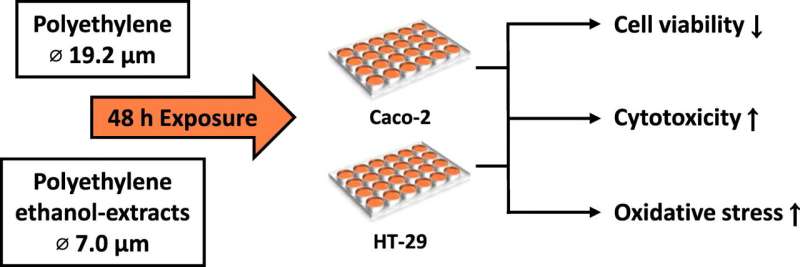This article has been reviewed according to Science X's editorial process and policies. Editors have highlighted the following attributes while ensuring the content's credibility:
fact-checked
peer-reviewed publication
trusted source
proofread
Micro-sized polyethylene particles show adverse effects in cell lines

Exposure to high doses of micro-sized polyethylene has adverse effects on cells, a new study from the University of Eastern Finland finds. The researchers investigated the toxicity of micro-sized polyethylene in two different human colorectal cancer cell lines. Being one of our most common plastics, polyethylene is used for a variety of purposes, for example as packaging material.
Exposure to high doses of polyethylene was found to decrease cell viability and increase the production of reactive oxygen species in cell mitochondria, which are vital energy-producing organelles.
The findings were published in Science of the Total Environment.
Humans are exposed to microplastics all the time
Microplastic particles are less than 5 mm in diameter. They can be specifically manufactured for, e.g., products of the cosmetics industry, but they are also formed as a result of fragmentation and degradation of plastic debris. The most common microplastic particles in our environment originate from car tire dust, artificial grass, and washing of clothes made of artificial fibers.
Humans are exposed to microplastics mainly through nutrition and air, and although this exposure is known to happen on a daily basis, the health effects of microplastics remain largely unknown.
Polyethylene particles caused adverse effects in human colorectal cancer cell cultures
Microplastics end up in our system especially through the gastrointestinal tract. In the new study, the researchers investigated the toxic effects of micro-sized polyethylene in two human colorectal cancer cell lines. In addition to raw, untreated polyethylene, the researchers also used polyethylene treated with ethanol to determine how the treatment process affects particle toxicity. Cells were exposed to plastic particles for 48 hours at several different doses.
Both raw, untreated polyethylene and ethanol-treated polyethylene caused cell death in the cell cultures at high doses. Cell viability was measured using two different methods, both of which showed the same result. The researchers also investigated the production of reactive oxygen species after exposure.
Reactive oxygen species are naturally produced in cells, but different exposures may also increase their number, possibly leading to adverse effects, such as DNA damage. Increased production of oxygen species was observed especially in mitochondria, i.e., the organelles producing energy for cells.
More microplastics research is needed to assess their health risks
The results of the study support earlier findings suggesting that microplastic particles may have adverse human health effects.
"However, the spectrum of microplastics is very broad, and their effects may vary greatly depending on, for example, polymer type and particle shape and size," the article's lead author, Postdoctoral Researcher Mikko Herrala from the School of Pharmacy at the University of Eastern Finland says.
"To reliably assess the health risks of microplastics, we need more information on the effects and mechanisms of different types and shapes of microplastics both on the cellular level and in animals. We also need data on human exposure to microplastics, as well as on the resulting effects on human health," Herrala concludes.
More information: Mikko Herrala et al, Micro-sized polyethylene particles affect cell viability and oxidative stress responses in human colorectal adenocarcinoma Caco-2 and HT-29 cells, Science of The Total Environment (2023). DOI: 10.1016/j.scitotenv.2023.161512
Journal information: Science of the Total Environment
Provided by University of Eastern Finland




















